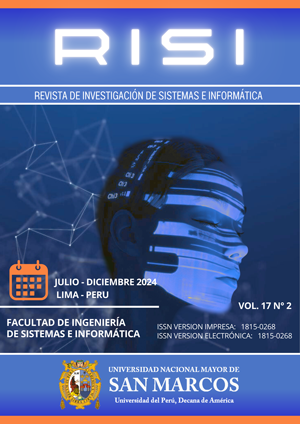Effectiveness of Machine Learning Predictive Models in the early diagnosis of depression: a systematic review
DOI:
https://doi.org/10.15381/risi.v17i2.29780Keywords:
Mental Health, Machine Learning, Depression, Deep Learning, Mental DisordersAbstract
This Systematic Review article seeks to contribute with a comparative analytical study of different machine learning methods to detect signs of depression from Machine Learning (ML) algorithms where artificial intelligence and mental health converge. This design not only provides a comprehensive view of scientific advances, but also identifies gaps in research that can guide future initiatives. Likewise, the analysis of the findings within the framework of a systematic design guarantees the generation of evidence-based recommendations for the implementation of predictive tools in public health systems, such as the Peruvian one. Regarding the socioeconomic burden of this disorder, it is necessary to carry out adequate detection of depression in order to reduce diagnostic times and allow the identification of signs in daily social interactions. Likewise, despite promising advances, challenges related to the generalization and interpretability of predictive models persist. The heterogeneity of depressive symptoms and demographic differences between populations limit the universal applicability of these models (Nickson D. M., 2023). However, the integration of machine learning into clinical practice represents a significant opportunity to improve early detection and treatment of depression, contributing to more personalized and effective care (Bhaumik, 2023).
In summary, the implementation of machine learning models in mental health shows promising progress in the prediction and diagnosis of mental disorders. However, significant challenges remain related to data quality, systems, and clinical applicability. Continued research and improvement of these models are essential to maximize their accuracy and utility in the treatment of mental health problems, allowing for earlier and more personalized interventions.
Downloads
Downloads
Published
Issue
Section
License
Copyright (c) 2024 Daniel Junior López Angeles

This work is licensed under a Creative Commons Attribution 4.0 International License.
AUTHORS RETAIN THEIR RIGHTS:
a. Authors retain their trade mark rights and patent, and also on any process or procedure described in the article.
b. Authors retain their right to share, copy, distribute, perform and publicly communicate their article (eg, to place their article in an institutional repository or publish it in a book), with an acknowledgment of its initial publication in the Revista de investigación de Sistemas e Informática.
c. Authors retain theirs right to make a subsequent publication of their work, to use the article or any part thereof (eg a compilation of his papers, lecture notes, thesis, or a book), always indicating its initial publication in the Revista de investigación de Sistemas e Informática (the originator of the work, journal, volume, number and date).


